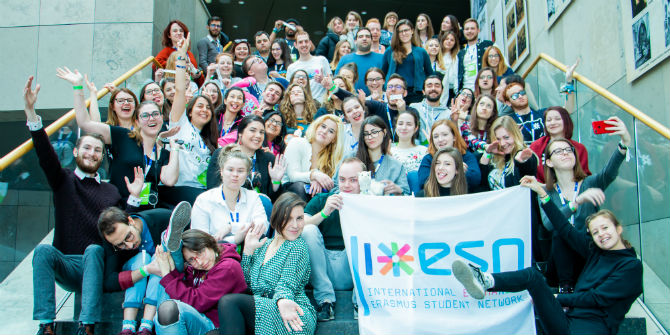

 Simone Baglioni, Olga Biosca, Tom Montgomery (Glasgow Caledonian University) reveal that those who were more likely to support Brexit in continental Europe belonged to social groups who have paid the highest costs for globalisation. They argue that this is because political leadership at the EU level has failed to defend societies from the scarring effects of globalisation and the global financial crisis.
Simone Baglioni, Olga Biosca, Tom Montgomery (Glasgow Caledonian University) reveal that those who were more likely to support Brexit in continental Europe belonged to social groups who have paid the highest costs for globalisation. They argue that this is because political leadership at the EU level has failed to defend societies from the scarring effects of globalisation and the global financial crisis.
There is almost always something final and conclusive when the result of a vote is announced, a sense that months if not years of debate have come to an end. For many, that feeling of conclusion of the debate surrounding the UK’s membership of European Union had been reached in the early hours of the morning of the 24 June 2016, when the veteran BBC broadcaster David Dimbleby uttered the words ‘we’re out’, confirming the decision of the electorate to vote to leave the European Union. However, rather than a sense of closure, the result opened up a number of other questions, not just ‘how did we get here?’ or ‘where are we going?’ but also, ‘what does this result mean for others?’.
Well over two years later, many of these questions remain unanswered. However, despite the air of uncertainty, there is something that is now apparent, Brexit was not an event, but a process and one that can only be properly understood by recognising the various factors that have shaped the context in which voters cast their ballots. It might be easy to imagine that the internal turbulence with the UK that has followed the Brexit process may quell the willingness of other European electorates to embrace the messages that so successfully managed to convince British voters to ignore every warning issued and every promise made by the remain campaign and instead to vote to leave the EU. However, in the course of our analysis, based upon individual-level survey data collected during a large comparative study, we found that any complacency about the potential for future political upsets should be tempered by the reality of the factors underpinning the causes of the Brexit vote. Moreover, our findings sound a warning for those currently campaigning in the run-up to the European Parliament elections taking place in May of this year.
Using data from a nationally representative survey conducted in 2016 for the Horizon 2020 TransSOL (Transnational Solidarity at Times of Crisis) study in eight European countries (Denmark, France, Germany, Greece, Italy, Poland, Switzerland and the United Kingdom), we analysed answers from 11,865 respondents to the question: ‘Should the UK remain a member or leave the EU?’ Among the countries in our study we found that there existed three groups: firstly, there were those countries where those who were ‘pro-brexit’ outnumbered ‘remainers’ such as Switzerland (67.4%), France (60.1%) and Greece (59.1%); then, there were respondents based in countries where ‘remainers’ outnumbered ‘brexiters’ such as Denmark (58.3%), Germany (58.6.4%) and Poland (75.7%). Finally, a third group showed a more even split between ‘remainers’ and ‘brexiters’: Italy and the UK where brexiters were 50.6% of the respondents.

However, to better understand the factors shaping these preferences, we dug deeper into the socio-demographic characteristics and the political attitudes of the respondents using statistical analysis. Our results revealed that those who were more likely to support Brexit across the eight countries were to be in those social groups who have paid the highest costs for globalisation: that is those workers whose jobs can more easily be (or have been) taken away either by outsourcing or automation and whose skills and work experience make hard to convert into the new global ‘smart’ economy of services and IT employments. These groups perceived a threat emanating from the opening doors of the EU project, which meant to them more immigrants to compete with them for the few available jobs, rather than more opportunities for them to seek jobs across the EU open borders. And that was the case even more for those living in countries with a poorer economic outlook or in a context that had sustained the worst impacts of the global financial crisis in 2008, such as Greece and Italy. Therefore one of the freedoms most prized by supporters of the European Union, the freedom of movement of people, is perceived as a threat rather than an opportunity by many citizens across Europe.
Thus our findings reveal the difficulty of the EU as a project to speak to those segments of European societies who could have gained most from the development of a single market and a polity sharing the same democratic values and a failure of political leadership to defend them from the scarring effects of globalisation and the global financial crisis. Rather than capitulating to the anti-immigrant and nativist rhetoric of right-wing populists, European leaders who believe in the idea of a Social Europe must now be bold not just in their words but also in their actions. Our findings did indicate a way forward. In our analysis, those citizens with a strong sense of individual attachment to the European Union were least likely to support Brexit. At first, this may seem obvious, but on reflection, it speaks to a crucial question of what the EU represents for the ordinary citizens as they take the kids to school on a cold Paris morning or return home late from another shift in a Warsaw factory. Those with a progressive vision of the European Union have much to accomplish and the extent of that challenge will, once again, become clear in the European Parliament elections in May.
This post represents the views of the author and not those of the Brexit blog, nor the LSE. The article connected to the blog has been published in the American Behavioral Scientist.
Prof Simone Baglioni is a professor of politics at the Yunus Centre for Social Business and Health, Glasgow Caledonian University.
Dr Olga Biosca is a senior lecturer at the Yunus Centre for Social Business and Health, Glasgow Caledonian University.
Dr Tom Montgomery is a postdoctoral researcher at the Yunus Centre for Social Business and Health, Glasgow Caledonian University.






